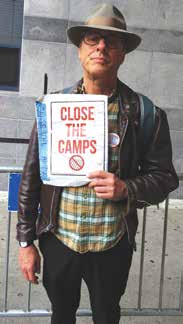“Standing in harm’s way” is such a powerful statement. For me, it evokes a fierce and resolute sense of protection. How many award-winning movies have we seen where someone comes to the rescue of their family, friend or lover? Who can forget the scene outside of the bar in The Adventures of Priscilla, Queen of the Desert, when Terence Stamp comes to the rescue of a fellow drag queen? Or in Terms of Endearment, when Shirley MacLaine comes to the aid of her hospital-bound, dying daughter, Debra Winger?
These powerful portrayals of a profile in courage are certainly not relegated to the big screen. They happen in and across our lives every day.
 For as far back as history will allow, it seems that we as a nation have always needed a boogieman—someone to fear and rally against. The affected sub-populations are too numerous to name, cut across the rich fabric of our country, and span centuries. The late Toni Morrison said, “Racism is a profound neurosis that has just as much a deleterious effect on the perpetrator as it does the victim. If you can only be tall when someone is on their knees then you have a serious problem.”
For as far back as history will allow, it seems that we as a nation have always needed a boogieman—someone to fear and rally against. The affected sub-populations are too numerous to name, cut across the rich fabric of our country, and span centuries. The late Toni Morrison said, “Racism is a profound neurosis that has just as much a deleterious effect on the perpetrator as it does the victim. If you can only be tall when someone is on their knees then you have a serious problem.”
It is difficult to get through the news without mustering up some sort of outrage around the ways in which some of our nation’s leadership continue to treat certain segments of our population. When cruel intentions are so obvious and exacting that even newscasters cannot get through a segment without tearing up, we know it is time to do something.
It’s hard to forget the profound segment on the Rachel Maddow show that concerned caged children, where Maddow could not make it through her reporting without completely breaking down, filled with anguish and pain. In her voice, I also heard a sense of resolve—to continue reporting on the atrocities committed by this administration and across the nation, all in an effort to educate and inform.
We have often been asked, or ask ourselves: What can we do about righting the injustice in the world? To so many of us, it all seems too complex, historic, endemic and intractable. Maybe some of that is true, but the challenges should not keep us from endeavoring to effect change in all of the ways that are meaningful, big and small.
As the election season heats up, we need to educate ourselves about the issues, as well as to gain a better understanding of the motivation of the rhetoric. What does it seek to accomplish? Whom does it impact? Whom or what is it trying to protect?
We must step forward and speak up for those who remain under-represented and discriminated against, who have been forced into the shadows of society because of fear and intimidation. It is not only our right, but also our civic and moral duty to hold the line on what is the best, most reasonable and acceptable thing to do: protecting and defending our brothers and sisters.
I hold in my heart abiding and deep appreciation to those who have stood in harm’s way for me over the years—thank you. We all have the capacity to do so; we just need the courage and the will. And, after all, wouldn’t we want the same thing done for us?
Leading PRC since 2003, Brett Andrews has overseen PRC’s evolution from a small HIV/AIDS legal service agency to an integrated social and behavioral health provider bent on fighting poverty, stigma and isolation by uplifting marginalized adults and affecting the social conditions of health. He holds an M.A. in Industrial/Organizational Psychology from George Washington University, received the San Francisco Pride Celebration’s Heritage Award for 10+ years of service in 2017, and was appointed to the San Francisco Mayor’s Methamphetamine Task Force. https://prcsf.org/
Recent Comments